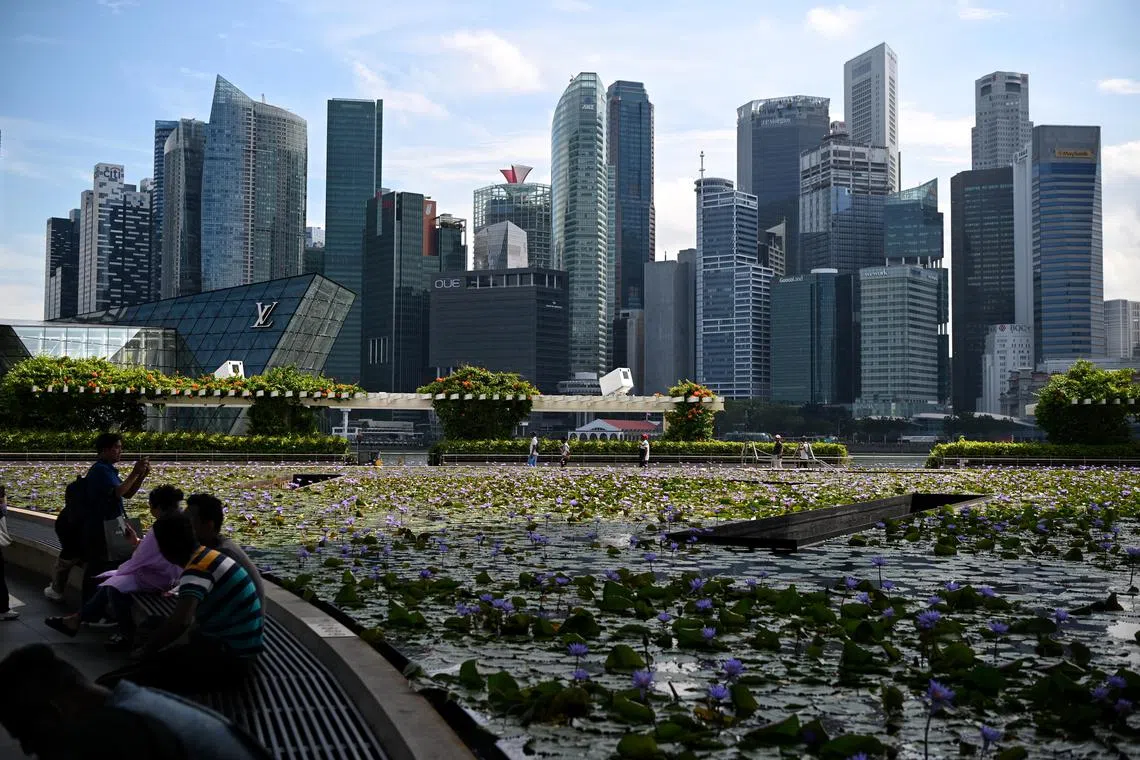Singapore expects slowing 2023 GDP growth, but technical recession unlikely
Sign up now: Get ST's newsletters delivered to your inbox

On a quarter-on-quarter seasonally adjusted basis, Singapore's economy shrank by 0.4 per cent.
ST PHOTO: KUA CHEE SIONG
SINGAPORE – The growth outlook for Singapore’s economy has become more challenging, but a significant downturn is still unlikely, the Ministry of Trade and Industry (MTI) said on Thursday.
It said the economy is expected to expand by 0.5 per cent to 2.5 per cent in 2023, with growth likely to come in at around the midpoint of the range.
Even as MTI’s guidance shows that the higher end of the forecast range is probably out of reach amid weak global demand for Singapore’s exports, the economy may still avoid a technical recession – two consecutive quarters of contraction – due to a resilient recovery in the service sector led by travel- and tourism-related businesses.
“We do not expect a technical recession this year,” said Ms Yong Yik Wei, MTI’s chief economist.
“But obviously, given the downside risks and the weakening outlook, we cannot rule out the possibility that there could be some quarters of negative quarter-on-quarter growth this year. But again, that’s not our baseline,” she said.
Most analysts, including those at DBS Bank and Nomura, agreed with MTI’s assessment, saying that while the economy will slow, another quarter of negative growth is unlikely.
MTI on Thursday also revised up its data for first-quarter gross domestic product growth. In the first three months of the year, the economy grew by 0.4 per cent year on year, slowing from the 2.1 per cent expansion in the previous quarter. The figure was higher than the advance estimate of 0.1 per cent growth released in April.
On a quarter-on-quarter seasonally adjusted basis, the economy shrank by 0.4 per cent, a reversal from the 0.1 per cent growth in the fourth quarter of 2022.
Still, this was better than the previous estimate of a 0.7 per cent decline and a forecast for a 0.6 per cent contraction in a Bloomberg survey.
Growth was weighed down by the trade-driven manufacturing, wholesale trade, and finance and insurance sectors, which contracted amid weakness in the global economy and the electronics down cycle,
Enterprise Singapore (EnterpriseSG) on Thursday slashed its 2023 growth forecasts
Both Nodx and total merchandise trade came in worse than expected in the first quarter. Nodx slid 16.2 per cent year on year, while total merchandise trade fell 7.8 per cent.
EnterpriseSG now expects Nodx to shrink by 8 per cent to 10 per cent, and total merchandise trade to decline by 6 per cent to 8 per cent, dragged down by the manufacturing down cycle and lower oil prices.
In its report, MTI said the outlook for Singapore’s economy has weakened.
Apart from the expected slowdown in the advanced economies,
Also, spillovers from China’s services-led recovery this year are also expected to remain weak, given that services activities are less import-intensive than industrial activities and hence provide little boost to Singapore’s exports.
“Growth in the United States and euro zone economies is expected to decelerate more significantly in the second half of the year due to the lagged effects of monetary policy tightening,” said Mr Gabriel Lim, Permanent Secretary for Trade and Industry.
He said that in tandem with weaker global demand for electronics and a sluggish outlook for petrochemicals, Singapore’s trade-driven manufacturing sector is projected to see a deeper downturn.
However, the growth outlook for the aviation- and tourism-related sectors of the Singapore economy remains positive, given the ongoing recovery in international air travel and inbound tourism.
DBS economist Chua Han Teng said that notwithstanding the quarter-on-quarter contraction in the first three-month period, he is not expecting a technical recession.
“In fact, we are expecting a turnaround in the second half, with our full-year 2023 growth forecast at 2.2 per cent,” he said.
While acknowledging the downside risks to his forecast, Mr Chua said the services clusters, particularly those linked to hospitality and tourism, will stay robust, given the improvement expected in travel activity and impetus from returning Chinese tourists.
Nomura senior economist Euben Paracuelles said that while he expects economic growth for 2023 to come in at around 1.1 per cent, Singapore should avoid a technical recession in the second quarter.
MTI also highlighted two major downside risks in the global economy – the recent banking sector stresses after the collapse of some regional lenders in the US and the demise of Switzerland’s Credit Suisse, and rising geopolitical tensions.
It said the risk of a sharper-than-expected tightening in global financial conditions amid the banking sector stresses could weigh more heavily on consumption and business investments and lead to a broader retraction in global growth beyond the manufacturing downturn.
Escalations in the war in Ukraine and geopolitical tensions among major global powers could also lead to renewed supply disruptions, dampen consumer and business confidence, and weigh on global trade, MTI warned.
In the first quarter, Singapore’s manufacturing sector shrank 5.6 per cent year on year, worsening from the 2.6 per cent contraction in the preceding quarter. Output declined across all clusters except for transport engineering.
On a quarter-on-quarter seasonally adjusted basis, manufacturing contracted 4.8 per cent, a pullback from the 1 per cent expansion in the previous quarter.
In contrast, the accommodation sector expanded 21.9 per cent year on year, accelerating from the 7.8 per cent growth in the previous quarter.
MTI said the sector’s growth during the quarter was supported by a strong recovery in international visitor arrivals from a low base in the same period in 2022 when inbound travel restrictions were still in place.
The food and beverage services sector grew 12.2 per cent year on year, driven largely by higher sales volumes at food caterers and restaurants.



